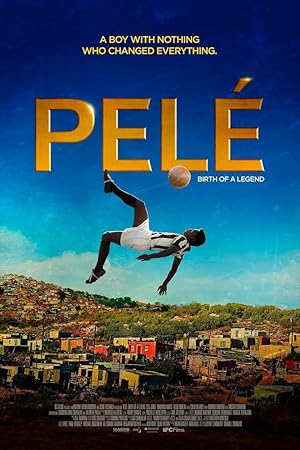I am not into sports, but I can be persuaded to watch and even enjoy a movie related to sports. Why did I watch Pele: Birth of a Legend? I adore Vincent D’Onofrio. My mom also wanted to see it because she does like sports and remembers Pele. Pele was the executive producer of Pele: Birth of a Legend so it should not come as a surprise that the movie is closer to a kids movie in the way that it presents the characters than a nuanced adult film where his flaws, if he ever had any, are explored.
Pele: Birth of a Legend shows how the titular character rose from the favelas of Brazil to become a world champion. There are plenty of standard tropes: the father who missed his chance at making it big, the scrappy poor kids team conquering the rich team, being haunted by the possibility of a career ending injury, adjusting to no longer being a big fish in a little pond or having to fit in to the standards of your team. Pele: Birth of a Legend has a tendency to drag, and I know nothing about the titular character’s life, but I found myself wondering if a lot of plot twists actually happened: the childhood rival as his mom’s employer and later teammate, the flash flood incident, etc. The acting is not that great, and sadly Pele: Birth of a Legend is clearly an American, not a Brazilian, film. All the characters speak English instead of Portuguese. Unlike City of God or City of Men, the director and lighting team for Pele: Birth of a Legend do not know how to make the various skin tones glitter distinctly like jewels. The shots are rather flat, and the colors are not as vibrant as they are in the Brazilian films that I have seen.
What makes Pele: Birth of a Legend distinctive? Pele: Birth of a Legend does a masterful job of addressing issues such as racism, colorism, classicism and colonialism. I think the Ginga story needed to be told earlier in the narrative. “It is primitive, but it has a long and rich history… It all started at the beginning of the 16th century… The Portuguese arrived in Brazil with African slaves. But the African’s will was strong, and many escaped to the jungle. To protect themselves, the run away slaves called upon the ginga, the foundation of Capoeira, the martial art of war. When slavery was finally abolished, the capoeiraistas came out of the jungle, only to find that capoeira was outlawed throughout the land. They saw football to be the perfect way to practice ginga without being arrested. it was the ultimate form of ginga. And before long the ginga evolved, adapted, until it was no longer just ours, but all Brazilians. But at the 1950 world cup, most believed our ginga style was to blame for the loss, and turned against anything associated with our African heritage. And just like your coach has been trying to remove ginga from your play, we have been trying to remove it from ourselves as a people ever since.”
Pele: Birth of a Legend’s critical story is one of choosing a national identity. Do you only embrace the European colonialist heritage that even the richest and whitest Brazilians cannot emulate and deride the African heritage as primitive? Pele: Birth of a Legend asserts that in order to win, there has to be a blend, but cautions that there is also a danger to blending. Dilute yourself too much and you will injure yourself, but embrace, commit to and enjoy every aspect of your heritage, and you can become a champion. Pele: Birth of a Legend may not be a solid movie, but I am a sucker for movies that know the key to making a country great is joyful celebration of struggle and diversity.
Stay In The Know
Join my mailing list to get updates about recent reviews, upcoming speaking engagements, and film news.





